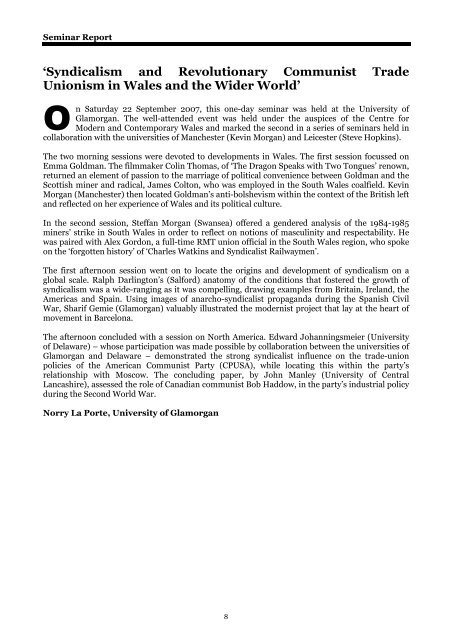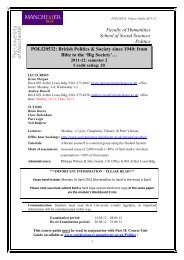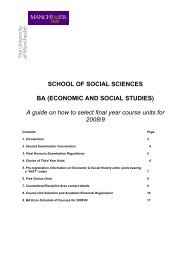CHNN 22, Spring 2008 - School of Social Sciences
CHNN 22, Spring 2008 - School of Social Sciences
CHNN 22, Spring 2008 - School of Social Sciences
Create successful ePaper yourself
Turn your PDF publications into a flip-book with our unique Google optimized e-Paper software.
Seminar Report<br />
‘Syndicalism and Revolutionary Communist Trade<br />
Unionism in Wales and the Wider World’<br />
O<br />
n Saturday <strong>22</strong> September 2007, this one-day seminar was held at the University <strong>of</strong><br />
Glamorgan. The well-attended event was held under the auspices <strong>of</strong> the Centre for<br />
Modern and Contemporary Wales and marked the second in a series <strong>of</strong> seminars held in<br />
collaboration with the universities <strong>of</strong> Manchester (Kevin Morgan) and Leicester (Steve Hopkins).<br />
The two morning sessions were devoted to developments in Wales. The first session focussed on<br />
Emma Goldman. The filmmaker Colin Thomas, <strong>of</strong> ‘The Dragon Speaks with Two Tongues’ renown,<br />
returned an element <strong>of</strong> passion to the marriage <strong>of</strong> political convenience between Goldman and the<br />
Scottish miner and radical, James Colton, who was employed in the South Wales coalfield. Kevin<br />
Morgan (Manchester) then located Goldman’s anti-bolshevism within the context <strong>of</strong> the British left<br />
and reflected on her experience <strong>of</strong> Wales and its political culture.<br />
In the second session, Steffan Morgan (Swansea) <strong>of</strong>fered a gendered analysis <strong>of</strong> the 1984-1985<br />
miners’ strike in South Wales in order to reflect on notions <strong>of</strong> masculinity and respectability. He<br />
was paired with Alex Gordon, a full-time RMT union <strong>of</strong>ficial in the South Wales region, who spoke<br />
on the ‘forgotten history’ <strong>of</strong> ‘Charles Watkins and Syndicalist Railwaymen’.<br />
The first afternoon session went on to locate the origins and development <strong>of</strong> syndicalism on a<br />
global scale. Ralph Darlington’s (Salford) anatomy <strong>of</strong> the conditions that fostered the growth <strong>of</strong><br />
syndicalism was a wide-ranging as it was compelling, drawing examples from Britain, Ireland, the<br />
Americas and Spain. Using images <strong>of</strong> anarcho-syndicalist propaganda during the Spanish Civil<br />
War, Sharif Gemie (Glamorgan) valuably illustrated the modernist project that lay at the heart <strong>of</strong><br />
movement in Barcelona.<br />
The afternoon concluded with a session on North America. Edward Johanningsmeier (University<br />
<strong>of</strong> Delaware) – whose participation was made possible by collaboration between the universities <strong>of</strong><br />
Glamorgan and Delaware – demonstrated the strong syndicalist influence on the trade-union<br />
policies <strong>of</strong> the American Communist Party (CPUSA), while locating this within the party’s<br />
relationship with Moscow. The concluding paper, by John Manley (University <strong>of</strong> Central<br />
Lancashire), assessed the role <strong>of</strong> Canadian communist Bob Haddow, in the party’s industrial policy<br />
during the Second World War.<br />
Norry La Porte, University <strong>of</strong> Glamorgan<br />
8
















